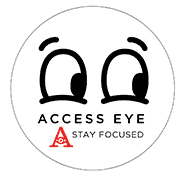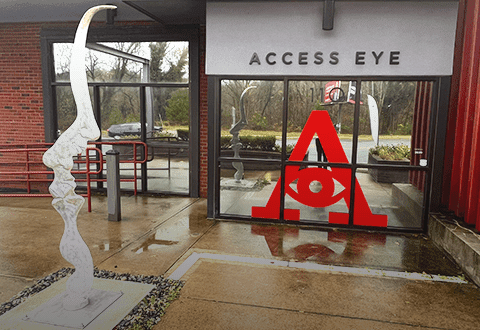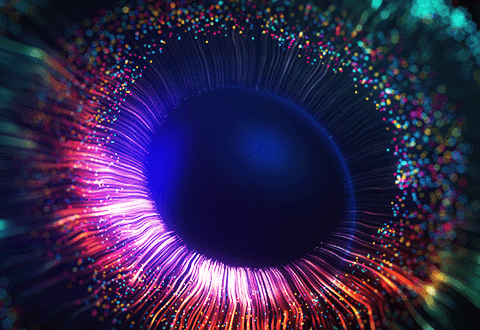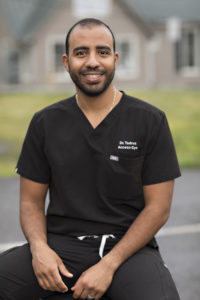PRK: Refractive Eye Surgery
Fredericksburg, VA
Photorefractive keratectomy, better known as PRK, is a popular type of refractive surgery. Though PRK is like LASIK in many respects, the procedure has a few key differences that may make it more appropriate for certain patients. The ophthalmologists at Access Eye have had continued success correcting myopia (nearsightedness), hyperopia (farsightedness) and astigmatism with PRK. Patients who have this laser surgery can see without needing to wear prescription lenses as often — if at all.

What Makes PRK Different
During LASIK, the ophthalmologist creates a small flap on the epithelium, the outer layer of tissue that covers the front of the cornea. After pulling back the flap, the ophthalmologist can use the laser to reshape the cornea to correct refractive errors. The flap is then put back into place.
With PRK, patients do not have a flap. Instead, the ophthalmologist gently removes the epithelium to access the cornea to correct with a laser. In the ensuing months, the epithelium naturally regenerates to protect the cornea again.
IMPROVING LIVES
THROUGH BETTER VISION
Why Some Patients Choose PRK Over LASIK
Although both refractive surgeries have low rates of complication, LASIK’s are slightly higher because of the flap created in the epithelium. Some patients choose PRK simply because they consider it safer, even if it means a longer recovery period.
Patients with thin corneas are usually not viable candidates for LASIK, but they are still eligible for PRK. Patients who have previously had refractive lens exchange, cataract surgery or intraocular lens implantation are also better candidates for PRK.
Because LASIK patients are significantly more likely to develop dry eye symptoms, Dr. Arash Mansouri often recommends PRK over LASIK, particularly for patients over the age of 40.
Additionally, since athletes who play contact sports are more prone to eye injuries, they may choose PRK over LASIK to avoid having the flap dislodge in the future.

PRK Procedure Details
Recovery
Patients should plan to rest and relax following surgery. Because their vision will be blurry, they will need to arrange for a ride home from Access Eye’s office. For most PRK patients, sight will improve significantly in a few days, although the full results may not arrive for several weeks. Patients are likely to experience moderate discomfort in the first few days, which can be managed with pain medication.
Follow the ophthalmologist’s post-surgical instructions, including taking prescription eye drops and wearing sunglasses when outdoors to avoid corneal scarring. The ophthalmologist will also schedule a follow-up appointment to ensure that the patient’s eyes are healing and progressing properly after PRK surgery.
FAQ
Will I be able to see without glasses after PRK?


Most patients achieve 20/40 vision or better after their surgery, meaning that they can see in most situations without the need for eyeglasses or contact lenses. Results vary from patient to patient, however, so you may need to wait until your eyes have fully recovered to determine how sharp your vision is without prescription lenses.
How do I decide between LASIK and PRK?


During a consultation for refractive surgery, your ophthalmologist will determine whether you are a good candidate for either LASIK or PRK. If only one option is appropriate, the ophthalmologist will explain the reasons at that time.
Most people are good candidates for both procedures, though. The team at Access Eye is happy to review the pros and cons of LASIK and PRK so that you can make a decision that is best for you.
Why should I choose Access Eye for PRK?


The ophthalmologists at Access Eye have a long, successful track record of improving patients’ eyesight with laser surgery. Dr. Arash Mansouri has been performing LASIK and PRK since the 1990s, and was the first doctor in the Fredericksburg, VA area to offer excimer laser service onsite.
To schedule a complimentary consultation for laser correction surgery, please call (540) 371-2020.
King George Office
7961 Kings Highway
King George, VA 22485
Phone: (540) 371-2020
Office Hours
Ophthalmology in King George, VA Hours
Mondays – 8:00am to 5:00pm
Tuesdays – 8:00am to 5:00pm
Wednesdays – 8:00am to 5:00pm
Thursdays – 8:00am to 5:00pm
Fridays – 8:00am to 5:00pm
Closed for lunch from 1:00pm to 2:00pm
Falmouth Office
110 Cambridge Street
Fredericksburg, VA 22405
(540) 371-2020
Office Hours
Ophthalmology in Falmouth, VA Hours
Monday – 8:00am to 5:00pm
Tuesday – 8:00am to 5:00pm
Wednesday – 8:00am to 5:00pm
Thursday – 8:00am to 5:00pm
Friday – 8:00am to 5:00pm
Route 3 Office
4516 Plank Road
Fredericksburg, VA 22407
(540) 371-2020
Office Hours
Ophthalmology in Fredericksburg, VA Hours
Monday – 8:00am to 5:00pm
Tuesday – 8:00am to 5:00pm
Wednesday – 8:00am to 5:00pm
Thursday – 8:00am to 5:00pm
Friday – 8:00am to 5:00pm
Parkway Office
4701 Spotsylvania Parkway
Suite 110
Fredericksburg, VA 22408
Office Hours
Ophthalmology in Spotsylvania, VA Hours
Mondays – 8:00am to 5:00pm
Tuesdays – 8:00am to 5:00pm
Wednesdays – 8:00am to 5:00pm
Thursdays – 8:00am to 5:00pm
Fridays – Temporarily Closed
Closed for lunch 1:00pm -2:00pm
Dedicated Laser Center
4516 Plank Rd
Fredericksburg, VA 22407
(540) 371-2020
Office Hours
Dedicated Laser Center Hours
Refer to hours listed for the Plank Road Location
Aquia Office
2761 Richmond Highway
Suite 205
Stafford VA, 22554
Office Hours
Ophthalmology in Stafford, VA Hours
Mondays – 8:00am to 5:00pm
Tuesdays – 8:00am to 5:00pm
Wednesdays – 8:00am to 5:00pm
Thursdays – 8:00am to 5:00pm
Fridays – 8:00am to 5:00pm
Closed for lunch 1:00pm -2:00pm




















